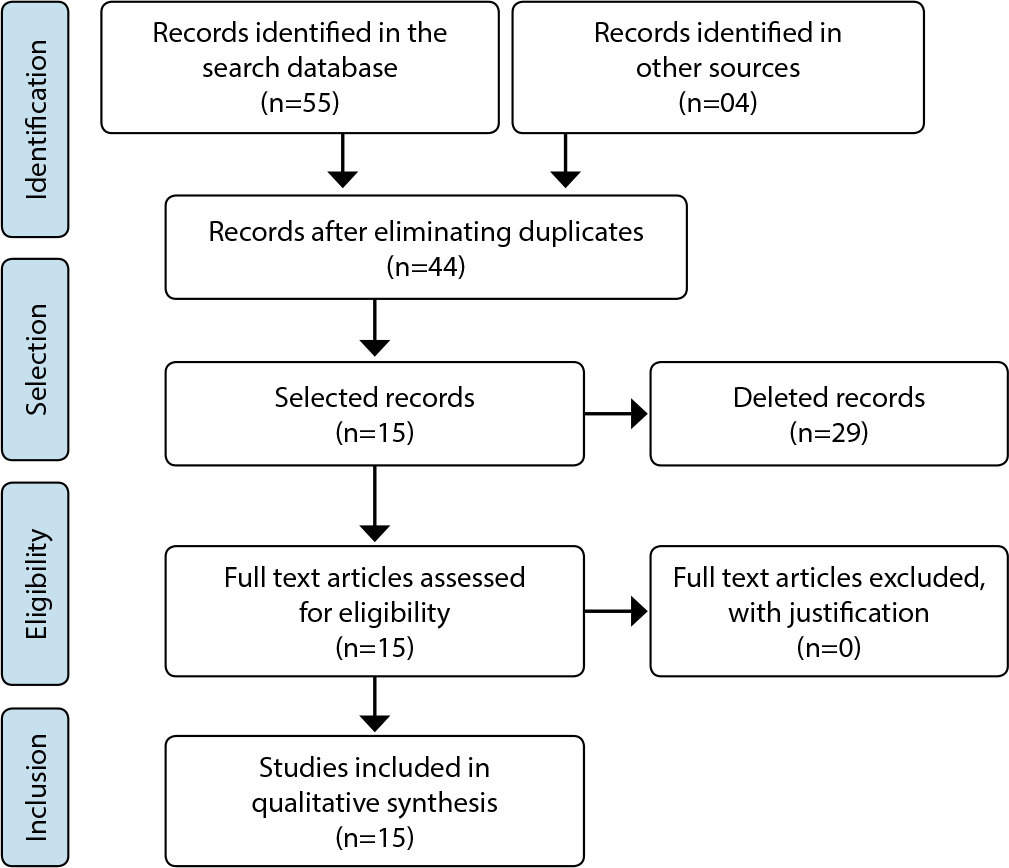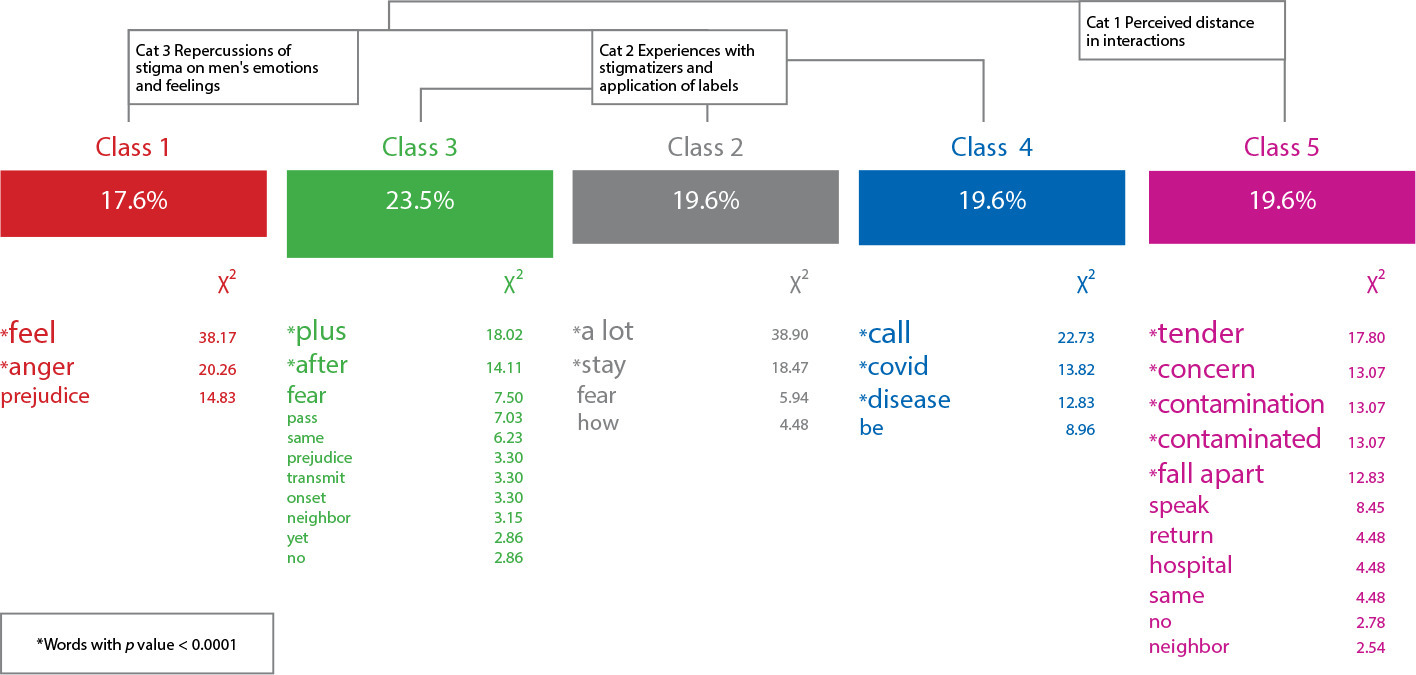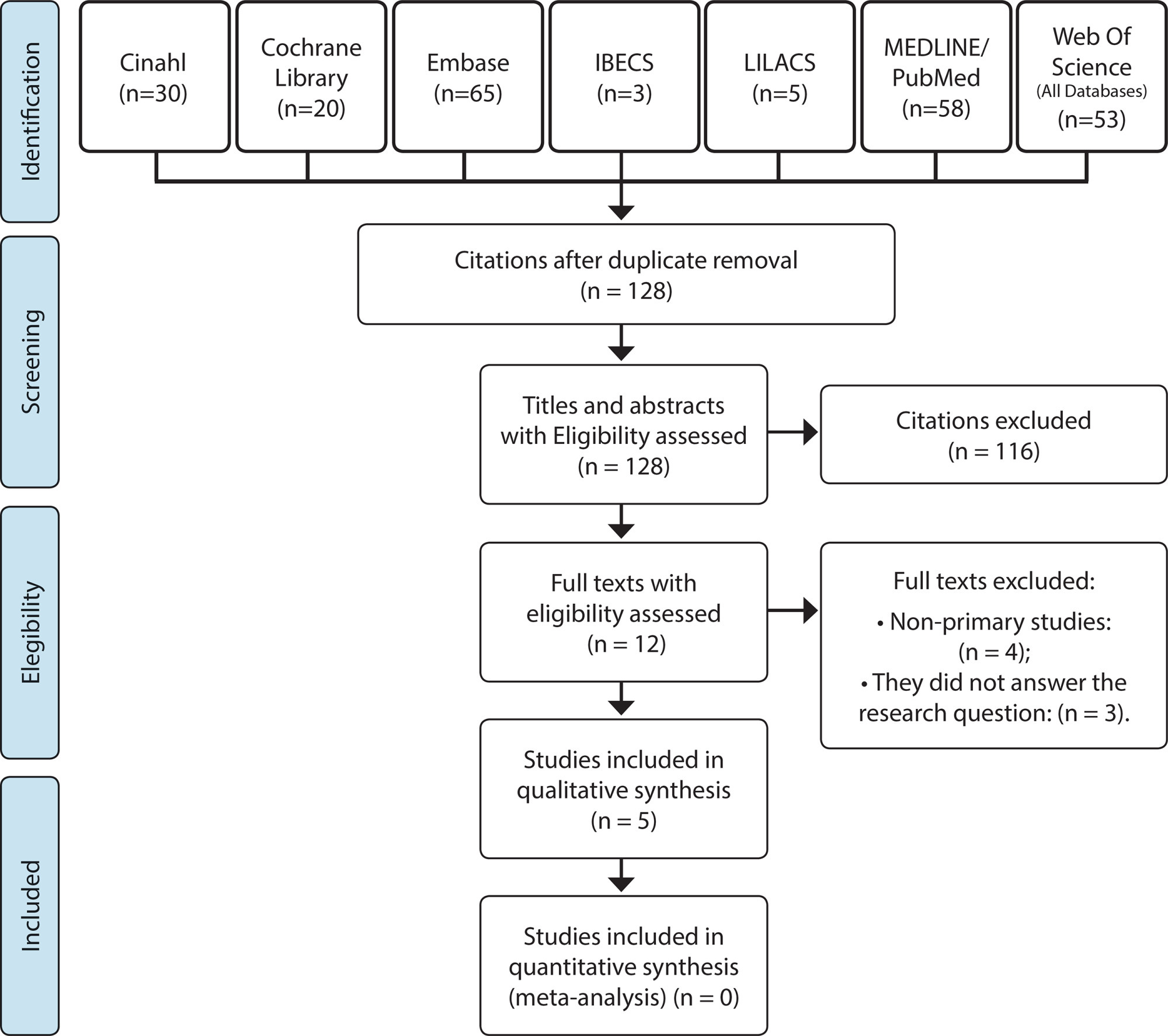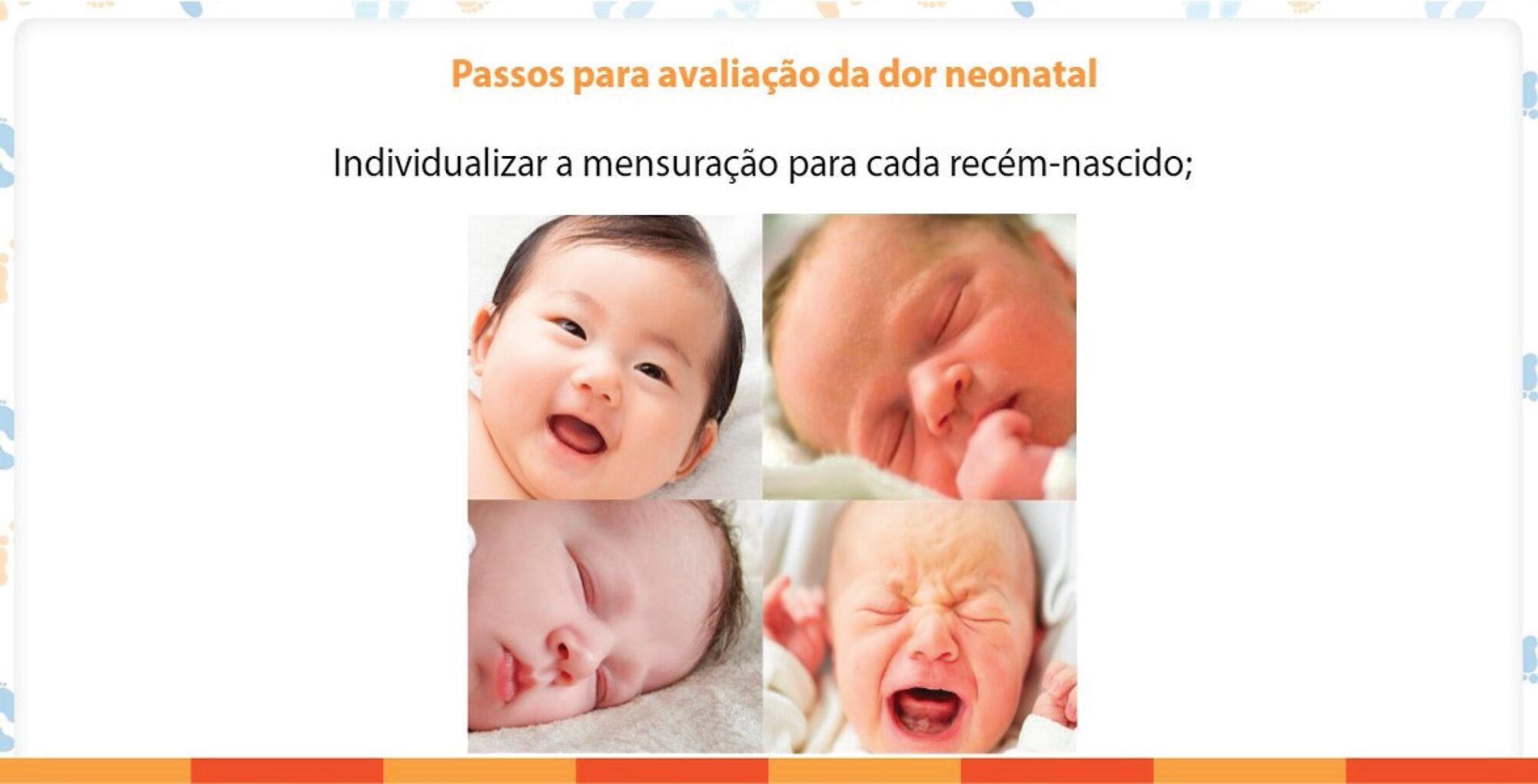-
11-25-2022
Populações vulnerabilizadas no contexto da pandemia e crises sanitárias
Revista Brasileira de Enfermagem. 2022;75:e75Suppl201
Abstract
Populações vulnerabilizadas no contexto da pandemia e crises sanitárias
Revista Brasileira de Enfermagem. 2022;75:e75Suppl201
DOI 10.1590/0034-7167.202275Suppl201pt
Views0As condições e os modos de vida da população determinam o processo de saúde e adoecimento de forma diferenciada entre os diversos grupos populacionais. As desigualdades na saúde vêm adquirindo relevância ainda maior na produção de diferentes perfis de doença, em função de recentes e surpreendentes acontecimentos mundiais, como divergências étnico-raciais, religiosas, territoriais, identidade de […]See more -
11-25-2022
Reflexões sobre a ciência em enfermagem gerontológica: possibilidades para o seu caminhar
Revista Brasileira de Enfermagem. 2022;75:e75Suppl401
Abstract
Reflexões sobre a ciência em enfermagem gerontológica: possibilidades para o seu caminhar
Revista Brasileira de Enfermagem. 2022;75:e75Suppl401
DOI 10.1590/0034-7167.202275Suppl401pt
Views0O conhecimento científico em enfermagem gerontológica brasileiro tem seus primórdios há mais de 50 anos, especificamente em meados de 1970, alinhados ao movimento mundial de reconhecimento da complexidade do envelhecimento populacional e dos seus desafios na esfera social, cultural, política e de saúde pública. Desde então, a produção científica nesse campo guarda relação com a […]See more -
11-19-2022
Advanced Practice Nursing: Canadian Perspectives and Global Relevance
Revista Brasileira de Enfermagem. 2022;75(1):e750101
Abstract
Advanced Practice Nursing: Canadian Perspectives and Global Relevance
Revista Brasileira de Enfermagem. 2022;75(1):e750101
DOI 10.1590/0034-7167.2022750101
Views0In this editorial, Advanced Practice Nursing (APN) will be explored as a practice model that could be implemented to strengthen health care systems globally. Canadian perspectives and the evolution of APN in Canada will be used as an example to identify potential opportunities for the conceptualization and implementation of advanced practice nursing that is both […]See more -
11-19-2022
Enfermagem de Prática Avançada: Perspectivas Canadenses e Relevância Global
Revista Brasileira de Enfermagem. 2022;75(1):e750101
Abstract
Enfermagem de Prática Avançada: Perspectivas Canadenses e Relevância Global
Revista Brasileira de Enfermagem. 2022;75(1):e750101
DOI 10.1590/0034-7167.2022750101
Views0Neste editorial, a Enfermagem de Prática Avançada (EPA) será explorada como um modelo de prática que pode ser implementado para fortalecer os sistemas de saúde globalmente. As perspectivas canadenses e a evolução da EPA no Canadá serão usadas como um exemplo para identificar oportunidades potenciais para a conceituação e implementação da EPA que seja abrangente […]See more -
ORIGINAL ARTICLE11-19-2022
Factors associated with the perception of fear of COVID-19 in university students
Revista Brasileira de Enfermagem. 2022;75:e20210448
Abstract
ORIGINAL ARTICLEFactors associated with the perception of fear of COVID-19 in university students
Revista Brasileira de Enfermagem. 2022;75:e20210448
DOI 10.1590/0034-7167-2021-0448
Views0See moreABSTRACT
Objective:
to analyze the factors associated with the perception of fear of COVID-19 in Brazilian university students.
Methods:
this is an online, cross-sectional analytical study conducted at a Brazilian public university with 1,437 undergraduate students between September and November 2020. The Fear of COVID-19 Scale was used to measure the main construct. Data analysis was performed using Mann-Whitney U test, Cohen’s r test and multiple linear regression analysis.
Results:
factors associated with fear of COVID-19 in university students were the variables biological sex, perception of good sleep quality, many days of access to information, not complying with social distancing, reporting sufficient hours of sleep, not having a partner, guidance sexual non-heterosexual, being in the risk group for COVID-19 and tobacco consumption.
Conclusions:
the study findings can contribute to the discussion about the weaknesses that the university population is experiencing in this pandemic period.
-
REVIEW11-19-2022
Nursing care for bed bath in patients with COVID-19: an integrative review
Revista Brasileira de Enfermagem. 2022;75:e20200704
Abstract
REVIEWNursing care for bed bath in patients with COVID-19: an integrative review
Revista Brasileira de Enfermagem. 2022;75:e20200704
DOI 10.1590/0034-7167-2020-0704
Views0See moreABSTRACT
Objective:
to identify the main nursing care procedures for performing bed bath in patients with COVID-19.
Method:
an integrative literature review. Five stages were followed for this research: research question elaboration (identification of the problem), search of studies in literature, study assessment, data analysis, and presentation of review. To search for primary studies, the VHL and SciELO databases were selected.
Results:
initially, 55 publications were found. After reading and analyzing the abstracts, the sample consisted of 15 studies.
Conclusion:
patients with the new coronavirus have specific care to perform a bed bath, oral, intimate and skin hygiene. It is important that professionals use adequate personal protective equipment, perform humanized care, continuously observing patients’ vital signs to avoid occurrence of adverse events, promoting patient safety.

-
ORIGINAL ARTICLE11-19-2022
Stigma experienced by men diagnosed with COVID-19
Revista Brasileira de Enfermagem. 2022;75:e20210038
Abstract
ORIGINAL ARTICLEStigma experienced by men diagnosed with COVID-19
Revista Brasileira de Enfermagem. 2022;75:e20210038
DOI 10.1590/0034-7167-2021-0038
Views0See moreABSTRACT
Objective:
to analyze the stigma characteristics perceived in the experience of men who had COVID-19.
Method:
this qualitative study involved men living in Brazil, diagnosed with COVID-19, who answered semi-structured questions in an online form. Data were subjected to thematic and lexical analysis, interpreted in the light of the stigma theory.
Results:
92 men, adults, cisgender, heterosexual, of mixed race/color, belonging to middle class, living in the urban area, with higher education participated. The stigma characteristics evidenced were the occurrence of leave, perception of impolite treatment, use of labels and discrimination by co-workers, family members, neighbors and even healthcare professionals, with consequences for the psycho-emotional dimension.
Final considerations:
discrimination and exclusion derived from stigma surprised men marked by class and gender privileges, little used to being downgraded in interactions when compared to other groups.

-
ORIGINAL ARTICLE11-15-2022
Suffering and defense mechanisms: an analysis of the work of Primary Health Care nurses
Revista Brasileira de Enfermagem. 2022;75:e20200419
Abstract
ORIGINAL ARTICLESuffering and defense mechanisms: an analysis of the work of Primary Health Care nurses
Revista Brasileira de Enfermagem. 2022;75:e20200419
DOI 10.1590/0034-7167-2020-0419
Views0See moreABSTRACT
Objective:
To analyze the suffering and coping strategies of nurses working in Primary Health Care considering the psychodynamics of their work.
Methods:
Descriptive study with a qualitative approach, carried out with 11 nurses working in Primary Health Care. Data were collected through semi-structured interviews, systematized, and interpreted using Bardin’s content analysis method applied to recurrent themes.
Results:
The suffering factors related to work in Primary Health Care are difficulties with management, the fragile structure of the health support network, and conflicts with the users. Defensive strategies to minimize these difficulties are the support of hierarchical superiors, the empowerment of the community and users, and communication between team members.
Final considerations:
It is important that there be changes in the organization of this line of work to improve the workers’ health.
-
ORIGINAL ARTICLE12-16-2024
Narratives of sex workers: intimate partner violence and coping strategies
Revista Brasileira de Enfermagem. 2024;77(6):e20240180
Abstract
ORIGINAL ARTICLENarratives of sex workers: intimate partner violence and coping strategies
Revista Brasileira de Enfermagem. 2024;77(6):e20240180
DOI 10.1590/0034-7167-2024-0180
Views0See moreABSTRACT
Objectives:
to understand the narratives of sex workers about violence suffered by intimate partners and their coping strategies.
Methods:
qualitative research, focused on thematic oral history, carried out with six sex workers in southern Brazil, who responded to in-depth interviews using a flexible script. Thematic content analysis was used.
Results:
the study included cisgender women who self-identified as half black and half white. Most had children and were separated. They reported abusive relationships by their intimate partners, with emphasis on verbal, psychological, financial, and physical violence and attempted femicide. Such violence resulted in coping strategies, such as avoiding emotional bonds and maintaining a discreet life.
Final Considerations:
intimate partner violence is prevalent among participants, leading them to adopt strategies to preserve their safety and well-being, highlighting the need for public policies that meet their particularities and guarantee protection.
-
ORIGINAL ARTICLE12-16-2024
Software for the care of people with cardiovascular risk: construction and evidence of validity
Revista Brasileira de Enfermagem. 2024;77(6):e20240276
Abstract
ORIGINAL ARTICLESoftware for the care of people with cardiovascular risk: construction and evidence of validity
Revista Brasileira de Enfermagem. 2024;77(6):e20240276
DOI 10.1590/0034-7167-2024-0276
Views0See moreABSTRACT
Objectives:
to build and validate software for the care of people with cardiovascular risk.
Methods:
a methodological study, applied to software development, anchored in a nursing theory and classification system, in three stages: 1) requirements engineering; 2) software architecture and coding; and 3) testing and content validity by 12 experts in computer science, with a Content Validity Ratio score.
Results:
called e-TEORISC, in software format, for nursing care for people with cardiovascular risk, online and offline, containing a database linked to the Nursing Process stages. Experts considered that the attributes of functional suitability, performance efficiency, reliability, maintainability, usability, safety and portability obtained desirable scores.
Conclusions:
e-TEORISC has evidence of validity to instrumentalize care for people at cardiovascular risk, with potential for technology transfer to the Brazilian Health System.

-
ORIGINAL ARTICLE08-30-2024
Meanings attributed to changes experienced by individuals after COVID-19 hospitalization
Revista Brasileira de Enfermagem. 2024;77:e20230122
Abstract
ORIGINAL ARTICLEMeanings attributed to changes experienced by individuals after COVID-19 hospitalization
Revista Brasileira de Enfermagem. 2024;77:e20230122
DOI 10.1590/0034-7167-2023-0122
Views0See moreABSTRACT
Objectives:
to understand the meanings attributed to the experiences of individuals after hospitalization for COVID-19.
Methods:
qualitative study, with a theoretical framework based on Symbolic Interactionism and a methodological approach grounded in Grounded Theory. Nineteen participants who had moderate and severe forms of COVID-19 after hospitalization were interviewed. Data collection took place between April and November 2021 through online interviews, and the data were analyzed using initial and focused coding in the MAXQDA software.
Results:
the data illustrate new meanings attributed to different aspects of life after hospitalization, including relationships with others, the environment, physical and mental health, finances, identity, and interactions with a new social reality.
Conclusions:
the meanings are intrinsically linked to the value of interpersonal relationships, the perception of their impact, and the consequences after hospitalization. This allows professionals to understand the importance of this information to improve care and prepare for future epidemics.

-
ORIGINAL ARTICLE08-30-2024
Patient safety culture in times of the COVID-19 pandemic: a cross-sectional study in a hospital
Revista Brasileira de Enfermagem. 2024;77:e20230187
Abstract
ORIGINAL ARTICLEPatient safety culture in times of the COVID-19 pandemic: a cross-sectional study in a hospital
Revista Brasileira de Enfermagem. 2024;77:e20230187
DOI 10.1590/0034-7167-2023-0187
Views0See moreABSTRACT
Objectives:
to assess patient safety culture during the COVID-19 pandemic and identify the dimensions that need to be improved in hospital settings and which sector, open or closed, direct or indirect care, exhibits a higher level of safety culture.
Methods:
a descriptive and cross-sectional study. The validated version for Brazil of the Hospital Survey on Patient Safety Culture instrument was applied to assess patient safety culture. Those dimensions with 75% positive responses were considered strengthened.
Results:
all dimensions presented results lower than 75% of positive responses. Closed sectors showed a stronger safety culture compared to open ones. Indirect care sectors had a low general perception of patient safety when compared to direct care sectors.
Conclusions:
with the pandemic, points of weakness became even more evident, requiring attention and incisive interventions from the institution’s leaders.

-
REVIEW08-30-2024
Educational actions conducted during the pandemic with primary health care professionals: a scoping review
Revista Brasileira de Enfermagem. 2024;77:e20230352
Abstract
REVIEWEducational actions conducted during the pandemic with primary health care professionals: a scoping review
Revista Brasileira de Enfermagem. 2024;77:e20230352
DOI 10.1590/0034-7167-2023-0352
Views0See moreABSTRACT
Objectives:
to map the educational actions conducted with primary health care professionals during the COVID-19 pandemic.
Methods:
a scoping review conducted in August 2023, which covered databases such as CINAHL, Medline, LILACS, IBECS, BDENF, and Web of Science. In total, 32 publications were analyzed through content analysis.
Results:
the primary beneficiaries of the educational actions included 69% physicians, 56% nurses, 25% pharmacists, 13% social workers and dentists, 9% psychologists, community health agents, and laboratory professionals, and 6% nursing technicians, nutritionists, and physical educators. The predominant educational interventions were training sessions (mentioned in 19 publications), followed by Continuing Health Education (10 publications) and Continuing Education (three publications).
Final Considerations:
the educational interventions demonstrated positive impacts on professional practice, particularly the Continuing Health Education actions, which were notable for stimulating critical problem-solving among professionals.

-
REVIEW08-30-2024
Impact of financial toxicity on adults with cancer during the COVID-19 pandemic: an integrative review
Revista Brasileira de Enfermagem. 2024;77:e20240078
Abstract
REVIEWImpact of financial toxicity on adults with cancer during the COVID-19 pandemic: an integrative review
Revista Brasileira de Enfermagem. 2024;77:e20240078
DOI 10.1590/0034-7167-2024-0078
Views0See moreABSTRACT
Objectives:
to identify the repercussions of financial toxicity on the lives of adult cancer patients during the COVID-19 pandemic.
Methods:
an integrative review was conducted using the PubMed, Web of Science, Scopus, and Embase databases, as well as the Virtual Health Library portal, in March 2023.
Results:
out of 62 studies found, 13 were included for analysis. The primary repercussions of financial toxicity included difficulties in covering basic expenses such as food, housing, medication, transportation, and internet access; increased anxiety and concerns related to health and financial situations; reduction or absence of income; challenges in obtaining treatment or accessing healthcare services; rising expenses; and telemedicine as a less burdensome alternative.
Conclusions:
the pandemic has exacerbated financial toxicity; therefore, healthcare teams must recognize it as an adverse event of oncological treatment and understand its potential to affect various aspects of patients’ lives.

-
03-08-2024
Nursing as a player in tackling vaccine hesitancy and refusal
Revista Brasileira de Enfermagem. 2024;77:e77suppl101
Abstract
Nursing as a player in tackling vaccine hesitancy and refusal
Revista Brasileira de Enfermagem. 2024;77:e77suppl101
DOI 10.1590/0034-7167.202477suppl101
Views1Since the 1970s, the Brazilian Ministry of Health established the Brazilian National Immunization Program (PNI – Programa Nacional de Imunização), which preceded the Brazilian Health System and which was incorporated and strengthened due to the decentralized model to municipalities, but under single command at central level. Its objective was and still is to coordinate vaccination […]See more -
12-16-2024
Religión y experiencia profesional: ¿Serán predictores de la inteligencia espiritual de los enfermeros? Estudio transversal
Revista Brasileira de Enfermagem. 2024;77(6):e20240217
Abstract
Religión y experiencia profesional: ¿Serán predictores de la inteligencia espiritual de los enfermeros? Estudio transversal
Revista Brasileira de Enfermagem. 2024;77(6):e20240217
DOI 10.1590/0034-7167-2024-0217es
Views1See moreRESUMEN
Objetivos:
analizar la relación entre religión y experiencia profesional con la inteligencia espiritual en enfermeros.
Métodos:
estudio transversal y analítico realizado en 2021, participaron 544 profesionales de enfermería que laboraban en establecimiento de salud de Perú durante la pandemia por COVID-19. Para el análisis de los datos se emplearon el análisis de regresión múltiple y correlación de Pearson.
Resultados:
en los enfermeros predominó un nivel de inteligencia espiritual saludable (42,8%). Quienes no profesaban una religión tenían mayor probabilidad de tener menor puntaje de inteligencia espiritual (escala global y dimensiones); sin embargo, los enfermeros expertos tuvieron mayor probabilidad de tener mayor inteligencia espiritual (escala global y dimensiones) que los enfermeros novatos (p<0,05).
Conclusiones:
la inteligencia espiritual en los enfermeros fue predicha por la religión y la experiencia profesional. Este hallazgo sugiere que la inteligencia espiritual en enfermería se consolida mediante prácticas religiosas y durante el ejercicio profesional.
-
REVIEW10-19-2020
Effectiveness of skin protectors and calendula officinalis for prevention and treatment of radiodermatitis: an integrative review
Revista Brasileira de Enfermagem. 2020;73:e20190815
Abstract
REVIEWEffectiveness of skin protectors and calendula officinalis for prevention and treatment of radiodermatitis: an integrative review
Revista Brasileira de Enfermagem. 2020;73:e20190815
DOI 10.1590/0034-7167-2019-0815
Views0See moreABSTRACT
Objective:
to analyze the effectiveness of skin protectors and Calendula officinalis for prevention and treatment of radiodermatitis.
Method:
an integrative review conducted at CINAHL, Cochrane Library, Embase, MEDLINE/PubMed, IBECS, LILACS, and Web of Science. The final sample consisted of five studies, four clinical studies and one preclinical. Critical appreciation and narrative synthesis of the findings were carried out.
Results:
the Cavilon™ skin protector was more effective than Sorbolene (cream with 10% glycerin) and less effective than Mometasone Furoate cream. Calendula officinalis was more effective than Trolamine and essential fatty acids and less effective than Ching Wan Hung® for prevention and treatment of radiodermatitis.
Conclusion:
data confirm the potential of Calendula officinalis for prevention and treatment of radiodermatitis and point to promising results regarding skin protector use; however, there is a need for further testing as to the effectiveness of such products.

-
ORIGINAL ARTICLE05-18-2020
Expert assessment of the “Neonatal Pain Assessment Program” online course
Revista Brasileira de Enfermagem. 2020;73(4):e20180392
Abstract
ORIGINAL ARTICLEExpert assessment of the “Neonatal Pain Assessment Program” online course
Revista Brasileira de Enfermagem. 2020;73(4):e20180392
DOI 10.1590/0034-7167-2018-0392
Views0See moreABSTRACT
Objectives:
to assess layout quality, visual identity and content of the “Neonatal Pain Assessment Program” (Programa de Avaliação da Dor Neonatal) online course.
Methods:
a descriptive exploratory study. The course was assessed by 24 experts in pain, neonatology and education. A form containing 20 questions on technical, interface and educational aspects was used. For each item, the score ranged from 0 to 1. Mean scores above 0.7 were considered indicative of high quality of the items. Descriptive statistics were used for data analysis.
Results:
navigation, clarity, ease of localization, content relevance, contextualization, content correction, multiple windows, ease of use, ease of return, ergonomics, esthetics, special brands, audiovisual resources, information and portability were assessed. All aspects obtained a mean ≥ 0.70 and no changes were required.
Conclusions:
the Neonatal Pain Assessment Program is considered as quality educational technology and promising strategy for health education.

-
01-22-2021
Humanization practices in the parturitive course from the perspective of puerperae and nurse-midwives
Revista Brasileira de Enfermagem. 2021;74:e20190743
Abstract
Humanization practices in the parturitive course from the perspective of puerperae and nurse-midwives
Revista Brasileira de Enfermagem. 2021;74:e20190743
DOI 10.1590/0034-7167-2019-0743
Views1See moreABSTRACT
Objective:
to understand humanization practices in the parturitive course from the point of view of purperae and nurse-midwives.
Methods:
an exploratory, descriptive, qualitative research carried out in a maternity hospital in Bahia State. Semi-structured interviews were carried out, with a structured script applied to 11 mothers and 5 nurse-midwives from March to June 2019. Analysis followed Bardin’s content structure.
Results:
this study unveiled the importance of using soft care technologies, respect for female role, active participation and women’s autonomy as a positive impact on the parturition process.
Final considerations:
nurse-midwives are qualified professionals to assist women in labor and birth. They can favor the implantation and implementation of care with humanization practices, respect for women’s choices and incentive to the normal way of delivery with an expanded view of individual and multidisciplinary needs.
-
REVIEW12-05-2019
Health promotion of frail elderly individuals and at risk of frailty
Revista Brasileira de Enfermagem. 2019;72:319-327
Abstract
REVIEWHealth promotion of frail elderly individuals and at risk of frailty
Revista Brasileira de Enfermagem. 2019;72:319-327
DOI 10.1590/0034-7167-2018-0575
Views0See moreABSTRACT
Objective:
To identify interventions for the health promotion of frail elderly individuals and those at risk of frailty.
Method:
Integrative review of the literature performed in the following databases: LILACS, CINAHL, MEDLINE, Web of Science, COCHRANE and Scopus, using the
Descriptors:
“frail elderly”, “aging”, “health services for the aged” and “health promotion” combined with Boolean operators “AND” and “OR”.
Results:
Randomized controlled clinical trials (RCTs) classified as level of evidence II represented 82.6% of studies. Interventions were analyzed according to the following categories: Interventions for the elderly at risk of frailty and Interventions for the frail elderly.
Conclusion:
The following interventions were identified: educational multiprofessional group meetings, physical training, home visit/home care program, nutrition assessment and supplementation, health maintenance programs and cognitive training; models/programs of management and monitoring, use of assistive technology devices and hospitalization program for geriatric rehabilitation.

-
ORIGINAL ARTICLE09-16-2019
Analysis of compliance to antiretroviral treatment among patients with HIV/AIDS
Revista Brasileira de Enfermagem. 2019;72(5):1295-1303
Abstract
ORIGINAL ARTICLEAnalysis of compliance to antiretroviral treatment among patients with HIV/AIDS
Revista Brasileira de Enfermagem. 2019;72(5):1295-1303
DOI 10.1590/0034-7167-2018-0115
Views1See moreABSTRACT
Objective:
To analyze the compliance to antiretroviral therapy among HIV/AIDS patients.
Method:
99 HIV-positive volunteers undergoing treatment responded to a semi-structured sociodemographic interview and to a questionnaire that assessed compliance to antiretroviral treatment.
Results:
In the sample analyzed, 52.5% of the volunteers presented good/adequate treatment compliance, while 33.3% presented low/insufficient compliance. There was no significant difference between men and women in the questionnaire score, nor between groups with different levels of education.
Conclusion:
The main items of the questionnaire that contributed to good/adequate compliance were: positive impact of treatment on health and quality of life, few side effects after initiation of therapy, and positive self-evaluation of participants regarding their compliance to antiretroviral therapy. The main barriers detected for compliance to antiretroviral therapy were the lack of knowledge about current medications and the lack of information on antiretroviral therapy drugs.
-
03-15-2021
Advanced Practice Nursing in Latin America and the Caribbean: seeking its implementation
Revista Brasileira de Enfermagem. 2021;74:e74suppl601
Abstract
Advanced Practice Nursing in Latin America and the Caribbean: seeking its implementation
Revista Brasileira de Enfermagem. 2021;74:e74suppl601
DOI 10.1590/0034-7167.202174suppl601
Views1Healthcare organizations are increasingly complex and specialized, seeking to optimize their quality and safety standards, and be able to meet the growing needs of their users. To face this reality, health professionals need to adapt to respond in time to the demands of the health context. In turn, the World Health Organization (WHO), through the […]See more -
ORIGINAL ARTICLE12-05-2019
Evaluation of delirium in aged patients assisted at emergency hospital service
Revista Brasileira de Enfermagem. 2019;72:153-160
Abstract
ORIGINAL ARTICLEEvaluation of delirium in aged patients assisted at emergency hospital service
Revista Brasileira de Enfermagem. 2019;72:153-160
DOI 10.1590/0034-7167-2018-0386
Views0See moreABSTRACT
Objective:
identify the occurrence of delirium in aged patients assisted in emergency services and verify its relationship with sociodemographic and clinical variables.
Method:
cross-sectional, prospective study with a quantitative approach. Two hundred aged hospitalized patients participated. The Confusion Assessment Method was used for data collection. For statistical analysis, chi-square tests, likelihood ratio and Fisher’s test were used, with a significance level of 5%.
Results:
male gender and mean age of 71.8 years were predominant. In the first 24 hours of hospitalization, 56 (28%) aged individuals presented delirium. An association of the disease with lack of physical activity, presence of a caregiver, hypertension, dyslipidemia and cerebrovascular diseases was identified.
Conclusion:
Delirium was associated with no physical activity, the need of a caregiver, and the presence of comorbidities. The importance of conducting other studies that may lead to early identification of the condition to prevent its complications is emphasized.
-
ORIGINAL ARTICLE04-22-2020
Men’s health care: construction and validation of a tool for nursing consultation
Revista Brasileira de Enfermagem. 2020;73(3):e20190013
Abstract
ORIGINAL ARTICLEMen’s health care: construction and validation of a tool for nursing consultation
Revista Brasileira de Enfermagem. 2020;73(3):e20190013
DOI 10.1590/0034-7167-2019-0013
Views0See moreABSTRACT
Objectives:
to elaborate and validate a data collection tool for nursing consultation with men in the context of Primary Health Care.
Method:
a methodological study developed in four stages. The first one consisted in tool elaboration, using databases and the Dorothea Orem’s theoretical model. In the second and third stages, content validation and tool appearance by 23 nurse judges took place. The Concordance Index was used for assessment. In the fourth stage, a pilot test was carried out with 20 men using Primary Health Care.
Results:
of the 145 indicators prepared, organized and submitted to validation process, items with the Concordance Index <0.80 were excluded. The final tool consisted of 156 items. An overall 0.88 Concordance Index calculation was obtained.
Conclusions:
the final tool presented content validity for data collection with men in Primary Health Care.
Search
Search in:
Nuvem de Tags
Adolescente (85) Atenção Primária à Saúde (239) COVID-19 (91) Criança (91) Cuidados de Enfermagem (269) Educação em Enfermagem (151) Educação em Saúde (139) Enfermagem (930) Enfermagem Pediátrica (86) Estudantes de Enfermagem (77) Estudos de Validação (131) Família (87) Idoso (208) Promoção da Saúde (99) Qualidade de Vida (104) Saúde do Trabalhador (86) Saúde Mental (145) Saúde Pública (82) Segurança do Paciente (150) Tecnologia Educacional (100)



